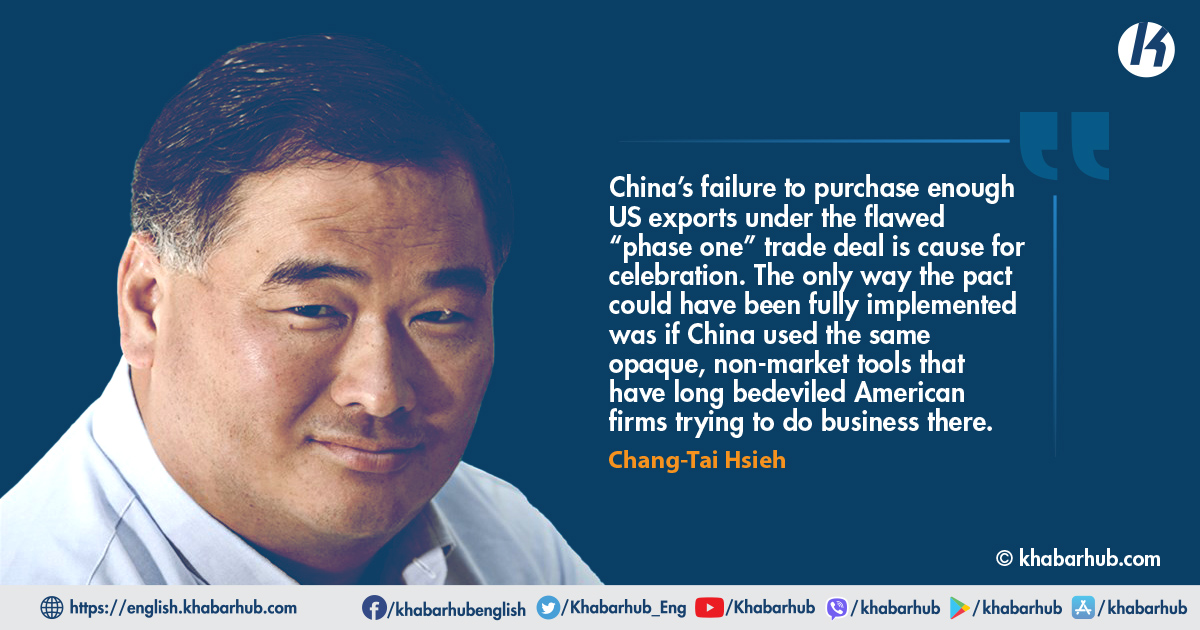Two years ago, in an attempt to end their deepening trade war, the United States and China signed an agreement in which China promised to purchase an additional $200 billion worth of US goods and services in 2020 and 2021, relative to 2017 levels.
That implied a total purchase commitment of $502.4 billion over the two-year period. In the end, China bought only 57% of the US exports that it had promised to buy, or $288.8 billion, and thus purchased none of the extra $200 billion.
But this shortfall, far from being a failure, should be a cause for celebration. That is because the only way the so-called “phase one” agreement could have been fully implemented was for China to use the same non-market tools that have long bedeviled American firms trying to do business there.
Former US President Donald Trump started the trade war in 2018 with the aim of forcing China to end its theft of US companies’ intellectual property, its subsidies for “strategic” sectors, and, more broadly, its use of non-transparent regulatory measures that harm US firms.
In January 2020, after multiple rounds of reciprocal tariff hikes had battered US-China trade, the two countries reached a settlement containing the Chinese purchase commitments.
Although the deal specified the amounts of different US products that China should buy, it did not stipulate any reduction in Chinese import tariffs or require China to make any legal and regulatory changes regarding the issues that had prompted Trump to initiate the trade war.
US companies may believe that they have benefited from preferential treatment by China under the purchase agreement, which expired at the end of 2021, but they will inevitably lose when state control is once again used against them.
These matters were instead to be addressed in later rounds of negotiations, presumably after China had shown its commitment to regulatory reform by meeting the purchase obligations.
But, absent any commitment to reduce tariffs or address structural issues, China could fulfill its commitments under the phase one deal only by resorting once again to opaque regulatory measures – except this time to favor US exporters and handicap their competitors.
For example, the Chinese authorities could have ordered state-owned firms to purchase American goods, or made it clear to private importers that they would benefit from doing the same in order to support “national policy.” Officials also could have ordered customs and health inspectors to favor US goods over products from other countries.
In the short run, these measures would have increased US exports to China and benefited American firms, but their long-run cost would have been enormous.
By increasing China’s reliance on non-market mechanisms to support its political and economic goals, they would have made leveling the playing field in the Chinese market an even more distant prospect.
More importantly, economic coercion – even if it benefits America – is still coercion, and recalls a dark period of Chinese history when the British used similar strong-arm tactics to sell more opium to China.
Lastly, even if doubling down on state control was merely an expedient short-term tactic as part of a long-term strategy, this would hardly imply that Chinese policymakers were somehow more committed to removing state control in the future. That is like telling an alcoholic that the first step on the path to sobriety is to drink more.
The Biden administration should urgently seek to redress this trade-policy imbalance by pursuing reciprocal tariff reductions with China. With US inflation having surged to a four-decade high, ending this damaging trade war as soon as possible should be a top priority.
It is no surprise that China prefers an agreement that strengthens state control and, for the time being, removes US pressure to undertake structural reforms.
US companies may believe that they have benefited from preferential treatment by China under the purchase agreement, which expired at the end of 2021, but they will inevitably lose when state control is once again used against them.
Japan implemented many long-overdue structural reforms in the late 1980s and early 1990s, partly as a result of pressure from US trade negotiators.
But the phase one agreement makes it unlikely that US pressure will prompt the Chinese government to undertake trade-related structural reforms. Chinese consumers and private firms will lose out as a result.
We should thus celebrate the fact that this flawed trade deal was not fully implemented. But what should be the next step?
There is overwhelming evidence that the main losers from higher US tariffs on imports from China are American consumers and firms that rely on Chinese inputs.
Four separate studies have shown that Americans have borne almost the entire cost of these tariffs in the form of higher prices.
But President Joe Biden’s decision to leave Trump’s tariffs in place raises the question of whether US trade policy has any concern for American consumers’ welfare, or is instead guided primarily by the need to bolster corporate profits.
The Biden administration should urgently seek to redress this trade-policy imbalance by pursuing reciprocal tariff reductions with China. With US inflation having surged to a four-decade high, ending this damaging trade war as soon as possible should be a top priority.
(Chang-Tai Hsieh is Professor of Economics at the University of Chicago Booth School of Business)
Copyright: Project Syndicate









Comment